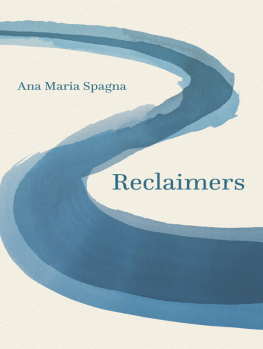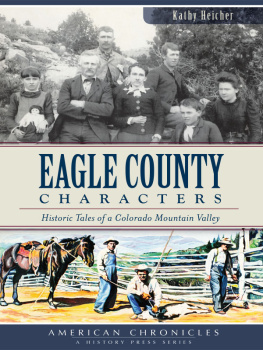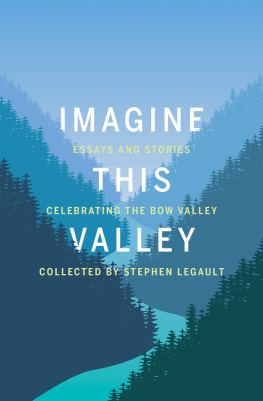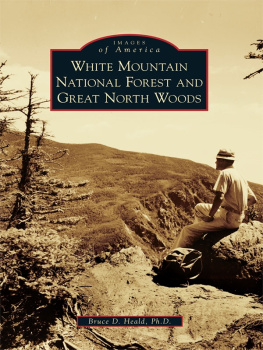
Reclaimers
Reclaimers
Ana Maria Spagna
UNIVERSITY OF WASHINGTON PRESS
Seattle and London
2015 by Ana Maria Spagna
Printed and bound in the United States of America
Design by Thomas Eykemans
Composed in Meta Serif, typeface designed by Erik Spiekermann
19 18 17 16 15 5 4 3 2 1
All rights reserved. No part of this publication may be reproduced or transmitted in any form or by any means, electronic or mechanical, including photocopy, recording, or any information storage or retrieval system, without permission in writing from the publisher.
UNIVERSITY OF WASHINGTON PRESS
www.washington.edu/uwpress
LIBRARY OF CONGRESS CATALOGING-IN-PUBLICATION DATA
Spagna, Ana Maria.
Reclaimers / Ana Maria Spagna.
pages cm
ISBN 978-0-295-99513-7 (hardback : alk. paper)
1. Northwest, PacificEnvironmental conditions.
2. Environmental protectionNorthwest, Pacific.
3. Reclamation of landNorthwest, Pacific.
4. Women environmentalistsNorthwest, PacificBiography.
5. Northwest, PacificBiography.
6. Indians of North AmericaLand tenureNorthwest, Pacific.
7. MountainsEnvironmental aspectsNorthwest, Pacific.
8. RiversEnvironmental aspectsNorthwest, Pacific.
9. Northwest, PacificDescription and travel.
10. Spagna, Ana MariaTravelNorthwest, Pacific.
I. Title.
GE155.N75S62 2015 333.715309795dc23 2015011382
The paper used in this publication is acid-free and meets the minimum requirements of American National Standard for Information SciencesPermanence of Paper for Printed Library Materials, ANSI Z39.481984.
Contents
Prologue
The Low Ground
T he two-acre property my wife, Laurie, and I own in Stehekin, a very small mountain town, divides cleanly in two: the high ground where we live now, atop an ancient moraine, and the low ground, where we lived years ago. In many ways, the halves are the same. Same trees. Same gravel road perimeter. Same mossy rocks. But while the high ground, these days, appears well-groomednative shrubs line the driveway, high-limbed firs filter sunlight, a fourteen-hundred-square-foot cabin stretches the definitionthe low ground has gone feral: crisscrossed with downed cottonwoods, littered with flood-strewn lumber, silty and splintered, discarded skis, rock rubble, and for a time, an unclaimed motorcycle helmet perched on a stump. No dwellings. Not anymore. One lone structure, a ramshackle garage half-sided and rat-infested, remains at the far end of the plat. We still use it for storage, so to retrieve our winter boots or a blow-up boat or a coffee can of lag screws, we must head down. But for a long time, I avoided the chore at all costs: procrastinating, excuse-making, dreading the sight of ground, supposedly our own, flushed, scoured, trashed, abandoned.
Truth is, the low ground was never much to brag about. When Lauries mother first saw the place, she wept. For good reason. A rusted off-kilter swing set lay in the yard alongside hardened bags of mortar, stockpiles of broken brick, and several untended outbuildings. Brush filled in the gaps: thimbleberries and Oregon grape and fireweed, all of it brown with road dust. The former owners, a family of seven, had lived in a small unfinished house sided with T1-11, and theyd made a hard go of it: a woodshed, a garden, a smokehouse, and a hog pen. They fled when a November flood brought the river charging to the doorstep, seeping through floorboards. They were rescued in the bucket of a front-end loader, and soon put the place on the market. And we, knowing all this, spent our life savings to buy it.
We had reason to weep, but we never did. We worked instead, the way only earnest new landowners can. We were used to manual laborboth Laurie and I had worked for years, by then, on backcountry trail crews for the National Park Service and the U.S. Forest Service, and Laurie still worked for the Park Service maintaining a historic apple orchard in the valleyand we were enamored, despite our left-leaning politics and our meager means, of the American Dream. We planned, eventually, to move to high ground, safely away from the danger of floods, but in the meantime we tore out moldy carpet and started anew: plumbing, insulating, stacking wood. We even planted a garden or, I should say, replanted the one that had washed to rubble in that November flood, then gone to weeds in one fallow summer. Reclaimed it, you might say.
We dug in cedar posts and spent $300a small fortune at the timeon concrete mesh, strung it eight feet high to keep the deer and bear out, and added compost and minerals to the rocky soil. One day when I was preparing to plant potatoes, the neighbors cat, Daisy, nudged up beside me, reared up on her hind paws, and began to dig full bore. With no idea what the purpose was, she threw herself at the task. Im telling you: she was one of us, this cat.
That was seventeen years ago now, but it seems so much longer. Floods ripped through the low ground not once but three times, leaving firewood scattered, cedar posts askew. Soil from the garden washed downvalley to fertilize brambles that finger now through misshapen rolls of mesh. We left the house empty, and we skedaddled. Daisy moved with us, trailing us to high ground with the neighbors blessing, claiming us and gifted to us both. Each fall I stand boot-tangled in blackberries to buck former cedar fence posts into chunks to split for kindling and fight a gnawing sense of loss.
But what did we lose? Not our lives, not our property. A neighbor couple had to sell off their flooded land, their summer home for over fifty years, to the government since thered be no way to avoid future floods and likely no willing private buyers. We lost nothing, really, other than three hundred bucks, a garden spot, and a few thousand hours of labor. Still I wonder: Was it worth it? What was it all for? Sometimes I cant face the low ground. Even though its what we planned to see happen, even though I love that David Byrne song about parking lots turning to daisies with a passion, I cant face it. Sometimes I need to get the hell out.
What happened on the low groundwhat we accomplished, what we failed to accomplish, what, if anything, we need to reaccomplishis what first got me thinking about reclamation. As long as I could remember, I thought the word had only to do with dams. The Bureau of Reclamation. Founded in 1902, tasked with reclaiming the arid West, making the desert bloom, building dams, dams, dams. By the late 1980s, when I landed in an auditorium-packed environmental studies class at college, the word held the scourge of outmoded arrogance: concrete oversized turbines, men with dress shirts stretched tight over their bellies, slide rules in their pockets, and god on their side. John McPhees Encounters with the Archdruid provided the prototype in Floyd Dominy, longtime commissioner of the Bureau. A few years later, when I landed on trail crew, a job that required stubborn work-in-the-dirt contrariness, I began to see outmoded arrogance in the counterview as well. Marc Reisners Cadillac Desert had predicted catastrophes of siltation that never quite materialized, not yet at least. Then there was Dominys antagonist in Archdruid, environmental superhero David Brower, whose crusade to save the Colorado River in the Grand Canyon from proposed dams in the 1960s, laudable as it was, offers little insight on how to provide water to the millions of people whove since flocked to the Southwest. When I taught Archdruid to college freshmen in the 1990s, mostly from suburban Phoenix, they approached the entire controversy with head-scratching befuddlement. After three full weeks, one young woman, one of the best students in the class, raised her hand to ask: How do they decide which side of the dam the lake goes on?
Next page









